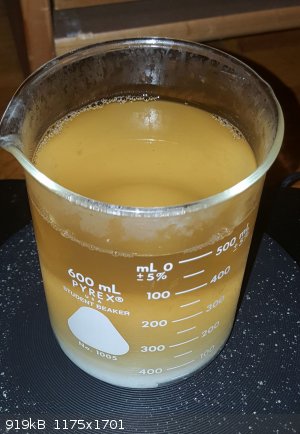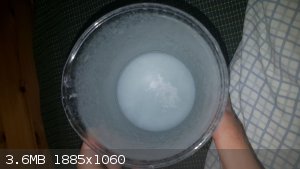Funkyman99
Harmless

Posts: 5
Registered: 3-9-2018
Member Is Offline
Mood: curious
|
|
Brown liquid in KOH drain cleaner
Hi! I'm relatively new to the forums so excuse me if I miss anything.
I was boiling some KOH drain cleaner in order to get solid KOH (for easier handling and transportation). I had done about half the bottle in one go
and had accidentally let the KOH solidify in the bottom of the beaker. I decided that the most time efficient method would just be to pour in the rest
of the drain cleaner and just boil off the rest of it and while it was cooling to pour it into a different surface to make sure I could break it up. I
shined a flashlight into the bottle to see how much was left and I saw a brown color. I originally had thought it was a brown stain in the bottle but
when I was pouring it out at the very bottom of the bottle this brown liquid came out. I am now unsure of how to proceed. I was considering adding
some hydrogen peroxide in case it was some kind of organic stabilizer but I'm afraid it will decompose too fast to have any effect. Should I go
forward and keep boiling it or is there some other approach? Thanks!
[Edited on 5-9-2018 by Funkyman99]
 
|
|
|
Deathunter88
National Hazard
   
Posts: 519
Registered: 20-2-2015
Location: Beijing, China
Member Is Offline
Mood: No Mood
|
|
Firstly, you will not get solid KOH of usable quality by boiling down an aqueous solution of the salt. It is simply too hydroscopic, and too reactive
with the CO2 in the air for you to end up with a pure product. I would suggest that you pour the solution you have back into the bottle and use it for
its intended use, as a significant portion of it would have converted to K2CO3.
Additionally, hydrogen peroxide is going to have trouble decomposing any organic contaminants given the conditions involved (aqueous solution at
relatively low temperature).
Your best bet is to find a drain cleaner containing solid KOH, and reserving your liquid drain cleaner for when you need aqueous KOH anyways.
|
|
|
Funkyman99
Harmless

Posts: 5
Registered: 3-9-2018
Member Is Offline
Mood: curious
|
|
Quote: Originally posted by Deathunter88  | Firstly, you will not get solid KOH of usable quality by boiling down an aqueous solution of the salt. It is simply too hydroscopic, and too reactive
with the CO2 in the air for you to end up with a pure product. I would suggest that you pour the solution you have back into the bottle and use it for
its intended use, as a significant portion of it would have converted to K2CO3.
Additionally, hydrogen peroxide is going to have trouble decomposing any organic contaminants given the conditions involved (aqueous solution at
relatively low temperature).
Your best bet is to find a drain cleaner containing solid KOH, and reserving your liquid drain cleaner for when you need aqueous KOH anyways.
|
Thank you!
However, would K2CO3 really form in an appreciable amount given the awfully low concentration of CO2 and the somewhat short exposure time to open air?
Concerning the peroxide, I was going to heat it but the heat itself would decompose the peroxide which I was worried about.
Edit: Oops forgot to mention that I don't really need the KOH as a solid it's just more annoying to carry around a large bottle rather than maybe a
wet slurry of the hydrate.
[Edited on 5-9-2018 by Funkyman99]
|
|
|
SWIM
National Hazard
   
Posts: 970
Registered: 3-9-2017
Member Is Offline
|
|
How's the beaker holding up to this?
I thought hot concentrated solutions like that would eat the glass pretty fast.
|
|
|
Funkyman99
Harmless

Posts: 5
Registered: 3-9-2018
Member Is Offline
Mood: curious
|
|
Quote: Originally posted by SWIM  | How's the beaker holding up to this?
I thought hot concentrated solutions like that would eat the glass pretty fast. |
Yeah I abandoned the project and dumped everything back in but too late. It ate through my beaker enough and it broke it. Learned something new though
:/
|
|
|
macckone
Dispenser of practical lab wisdom
    
Posts: 2168
Registered: 1-3-2013
Location: Over a mile high
Member Is Offline
Mood: Electrical
|
|
Liquid drain cleaner is going to have some pretty rough contaminants.
You can isolate KOH from the liquid but it is going to be difficult and you can't use glass, as you discovered.
You need a stainless steel pan with a lid larger than the pan, pie tins work great but don't use aluminum, splattering KOH will eat holes in it. This
is also why you should use a cover.
Commercial KOH usually contains appreciable carbonate. So the absorption of CO2 is not a major concern.
After you get a relatively dry solid, you need to add enough water to dissolve 90% of the solids and repeat the drying process.
This will yield a crude product that can be dried further by putting in a desiccating chamber with a more aggressive drying agent.
|
|
|
fusso
International Hazard
    
Posts: 1922
Registered: 23-6-2017
Location: 4 ∥ universes ahead of you
Member Is Offline
|
|
Maybe boil the solution to dryness in steel container carefully, then further heat the soild carefully to decompose any organics?
|
|
|
macckone
Dispenser of practical lab wisdom
    
Posts: 2168
Registered: 1-3-2013
Location: Over a mile high
Member Is Offline
Mood: Electrical
|
|
Yes, it needs to be pretty hot to get a good dry product.
This is how it is processed commercially.
It melts at 360C.
|
|
|
Sulaiman
International Hazard
    
Posts: 3695
Registered: 8-2-2015
Location: 3rd rock from the sun
Member Is Offline
|
|
just curious
Where in the world is KOH sold as drain cleaner ?
NaOH is common but I've not seen KOH used.
As KOH is more expensive than NaOH I suspect that the drain cleaner is a by-product / residue from some industrial process,
in which case it could have contaminants, that would not affect its use as a drain cleaner ?
OR
as it is supplied in liquid form, the brown may be a dye to warn consumers of the danger ?
(does the container label suggest shaking the bottle before use ?)
QUESTION :
I have solid NaOH (90% and 99%) and KOH,
would a microwave oven be useful for / achieve dehydration ?
[Edited on 7-9-2018 by Sulaiman]
|
|
|
Dan Vizine
National Hazard
   
Posts: 628
Registered: 4-4-2014
Location: Tonawanda, New York
Member Is Offline
Mood: High Resistance
|
|
Funkyman99
OK, I realize that we don't want to stifle amateur experimentalism, but is that what this actually is? It sounds more like reagent preparation for
more interesting work. As such, the cost of drain cleaner, the destroyed glassware, the electricity and most importantly, your time, seems to be a
high cost to pay vs. just buying it on eBay. For instance, https://www.ebay.com/itm/Potassium-Hydroxide-4oz-20-Lb-Caust... Buy a pound of food grade KOH with 3-day free delivery for $12. Not all good
advice has to be technical.
Now, I don't know where you live as you choose not to share that, so this answer may not apply to you. But if you can access materials on eBay, do it.
I've heard others here disparage eBay because of a few over-publicized frauds (mostly concerning gold), but I've purchased reagents on eBay for a
decade and I've NEVER gotten anything other than exactly what the seller claimed it to be. Just don't buy from "mystery" sellers or those with less
than a 99% score, or better, and you won't go wrong. Save your time (which young people think is endless) for your real passion or goal. Re-inventing
the wheel never profited anyone.
"All Your Children Are Poor Unfortunate Victims of Lies You Believe, a Plague Upon Your Ignorance that Keeps the Youth from the Truth They
Deserve"...F. Zappa
|
|
|
macckone
Dispenser of practical lab wisdom
    
Posts: 2168
Registered: 1-3-2013
Location: Over a mile high
Member Is Offline
Mood: Electrical
|
|
KOH is sold as an active ingredient in liquid drain cleaners in the US. It is superior to NaOH in that when it reacts with fat it produces a liquid.
For common household clogs this is VERY useful.
KOH liquid drain cleaner is often a by-product of another manufacturing process, specifically liquid soap manufacture. So it is full of contaminants
but safe for home use as a drain cleaner. Most of the contamination is literally surfactants.
|
|
|
Funkyman99
Harmless

Posts: 5
Registered: 3-9-2018
Member Is Offline
Mood: curious
|
|
I got mine from a brand called Pequa heavy duty drain opener. I don't think the brown stuff was a dye because it all settled at the bottom as one mass
(insoluble).
|
|
|
Funkyman99
Harmless

Posts: 5
Registered: 3-9-2018
Member Is Offline
Mood: curious
|
|
Quote: Originally posted by Dan Vizine  | Funkyman99
OK, I realize that we don't want to stifle amateur experimentalism, but is that what this actually is? It sounds more like reagent preparation for
more interesting work. As such, the cost of drain cleaner, the destroyed glassware, the electricity and most importantly, your time, seems to be a
high cost to pay vs. just buying it on eBay. For instance, https://www.ebay.com/itm/Potassium-Hydroxide-4oz-20-Lb-Caust... Buy a pound of food grade KOH with 3-day free delivery for $12. Not all good
advice has to be technical.
Now, I don't know where you live as you choose not to share that, so this answer may not apply to you. But if you can access materials on eBay, do it.
I've heard others here disparage eBay because of a few over-publicized frauds (mostly concerning gold), but I've purchased reagents on eBay for a
decade and I've NEVER gotten anything other than exactly what the seller claimed it to be. Just don't buy from "mystery" sellers or those with less
than a 99% score, or better, and you won't go wrong. Save your time (which young people think is endless) for your real passion or goal. Re-inventing
the wheel never profited anyone. |
Yeah I think I'll definitely stick to better sources and reagents. Thank you though!
|
|
|
S.C. Wack
bibliomaster
    
Posts: 2419
Registered: 7-5-2004
Location: Cornworld, Central USA
Member Is Offline
Mood: Enhanced
|
|
Many years ago while exploring Kmart as an OTC source a gallon of their KOH cleaner caught my eye being cheap on sale. It was light blue and I took
the cap off in the hope of getting the carbonate to precipitate at some point...it was checked often over some weeks or months. Suddenly it was as
clear and colorless as water and I poured it out, then started getting a brown powder stream...from what I remember as rust. Very fine rust, or
something, from air oxidation of the blue color. With no precipitated carbonate. IIRC acid evolved little to no CO2 and it worked fine for whatever I
used it for, but no more was bought.
|
|
|